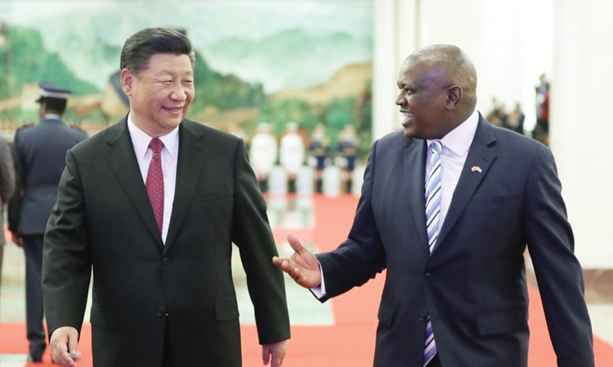Botswana is about to experience a surge in Chinese tourists following the relaxation of VISA regulations, that is if trends from similar developments are anything to go by.
When Morocco declared a VISA exception in June 2016 the number of Chinese travellers to the country zoomed by 440%, Tunisia’s Chinese arrivals surged 215% when they did the same in February 2017 and closer home Angola saw a surge of 85% when they simplified their VISA application procedures in January 2018.
This was revealed by Olivier Ponti, Vice President of Insights for ForwardKeys, who presented his findings at the first Africa Leaders Forum organised by the World Travel and Tourism Council (WTTC) in Cape Town on Thursday.
These numbers should come like nice piece of music to Botswana policy makers, particularly after President Mokgweetsi Masisi announced a new move of offering VISA on Arrival for those coming to the country.
The move that has received wide acclamation was due to be rolled out from November 24. And if at conception it targeted the Asian market, it tallies with the steps that President Masisi has been deliberately taking to win over Chinese investment.
He insisted that he would prefer to see a turnaround in immigration policy, saying he wanted to see it more facilitating investors’ arrivals than frustrating them. Though this primarily targets Africans it appears there will be a positive consideration given to other nationalities.
“BFTU as a member of the African Trade Union Migration Network (ATUMNET) has been championing this cause for an improved integrated Africa under her “Visa Open Africa” campaign. This campaign was developed to achieve the implementation of the July 2015 Johannesburg AU Heads of State Summit declaration on “Migration and Development”, which among other laudable positions stated that the Member States shall work towards the realisation of visa on arrival for ALL persons bearing African passports,” said BFTU Secretary General Thusang Butale in a statement.
In fact, this step added to the accolades the country has already been receiving for its sustainable tourism model.
Tshekedi attraction
Tourism Minister Tshekedi Khama was the toast of the Africa Leaders Forum this week, where he shared Botswana’s success story. He placed Botswana’s uniqueness as rooted in receptiveness, and the fact that the country was protected than colonised.
“We were fortunate that we never had to say this was taken from us. Botswana had a very definite position of what it wanted to achieve. We were not aggressive to our neighbours and were more receptive to them. This is what made our DNA,” he said.
The minister declared that for Botswana the deliberate policy was for sustainability, even when reducing volumes. “This business of we are all going to get along won’t work for us,” he said, hailing the move of offering VISAs on arrival as a step that will remove the add-ons. “We can now be the final destination,” he said.
With the implementation of the new VISA policy resting with the Ministry of Immigration, it is expected that more logistics work shall be undertaken to smooth out the delivery of the process. Achieving seamless travel and convenience for tourists, observers say, will require more including offering a regional package and improving connectivity, particularly in Africa where travellers still need to connect flights in Europe to reach the other part of the continent.
Connectivity
WTTC President & CEO, Gloria Guevara Manzo welcomed Botswana’s decision. “The country has done a wonderful job of offering VISA on arrival. But I want to see more countries doing this. Travellers now want to ensure that they get more from one trip. One VISA should enable them to travel the whole region than just one country. When we allowed the American VISA (in Mexico) our tourists immediately grew by 1.5 million people drawn from 148 nationalities,” she said in an interview.
She said once the VISA issue has been sorted out connectivity in Africa should be the new priority. “There were four billion air travellers in Europe with one billion of these being internal travels in the Continent. Growth in air travel is unbelievable. This number will double. Africa has a very huge potential in this area. Our projections are that in Africa tourism will create between 32 and 42 million jobs in the next 10 years. And that is if we do it right,” she declared.
According to Olivier Ponti’s research outcome, international seats capacity for Sub Saharan Africa grew by 9.1% per cent in 2018 with 5.1 per cent being internal travel in the continent. Interestingly Addis Abba has this year surpassed Dubai to be the leading connector in international travel to the continent, leaving other connecting cities of Johannesburg and Nairobi behind.
Jobs and more jobs
The statistics presented at the Africa Leaders Forum show a tourism sector that is bound to grow even faster. The 2017 figures show that Travel and Tourism saw its total contribution to GDP on the continent surging by 8.1% with an increase of 6.5% jobs supported by the sector.
Globally for the seventh consecutive year Travel and Tourism outgrew the global economy by exceeding the 3% global GDP growth to 4.6%. Travel and Tourism’s total contribution to global GDP grew to 10.4 per cent while supporting 313 million jobs. One in five of all new jobs created across the world came from Travel and Tourism.
With the exponential rise of the tourism sector so also do the risks associated with it. “We conducted one-to-one interviews with 80% of our members and identified the top three strategic priorities being Security and Travel facilitation, Crisis Management and Recovery; and Sustainable Growth,” said WTTC President & CEO.
Other minefields to be navigated against include consistent and un-ambiguous messaging and managing the tourism eco-system with prudence to avoid conflicts. “Growth should not be at all costs; otherwise people can rebel and chase tourists away,” warned CEO of Tourism South Africa, Siza Ntshona.
